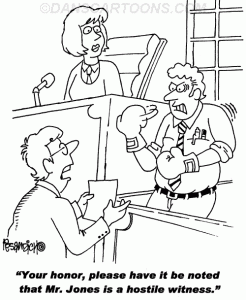What to Expect During an IEP Hearing
While a due process hearing for an Individualized Education Program (IEP) is a legal procedure, it is also different from a typical court case. It will not be held in a courtroom. Instead of a judge and jury, a hearing officer is responsible for examining the evidence, hearing testimony, and making a binding decision. The hearing officer may not be employed by the school district – he is a neutral third party.
IEP hearings can be intimidating. For best results, prepare for the hearing as far in advance as possible. It’s also recommended that you bring legal counsel and your partner, if applicable. You’ll want to have someone there to take notes for you throughout the hearing so that you can pay strict attention to the proceedings. While you can bring your own tape recorder, you won’t have time to refer back to the recording while you are questioning the school district’s witnesses.
Initial Procedures
The hearing officer will first explain how the hearing works. He will confirm the exhibits, witness lists, and written testimony that you and the school district submitted in advance. He will then turn on a tape recorder.
You will have the opportunity to make your opening statement first. Expect your statement to last about five to 15 minutes. It’s recommended that you read from a written statement or at least refer to notes with your key points. In your statement, briefly discuss your child’s disability and his current education program. Succinctly state his needs and why the school district is not meeting them. Conclude your statement by listing what you hope to accomplish. For example, if your child requires one-on-one sessions and the school district is only offering group sessions, discuss this. Each one of your child’s needs must be backed up by your submitted evidence – such as the speech therapist’s recommendations. After your opening statement, the school district representative will read his own opening statement.
Witness Testimony
After the opening statements, you will question your witnesses first. The school district representative will then cross-examine your witnesses. You may follow up with additional questions for the same witnesses. Following this, the same procedure is used for the school district’s witnesses. After that, you have the right to call rebuttal witnesses to address any points that the school district’s witnesses discussed. If you call rebuttal witnesses, the school district representative may call his own rebuttal witnesses after you are finished.
Unlike your opening statement, it’s difficult to know in advance exactly what you are going to say to each witness and vice versa. Yes, you can – and should – have a list of prepared questions for each witness, including the school district’s witnesses. However, a witness may answer in a manner that you did not anticipate, forcing a rephrasing of the next question or perhaps requiring a follow-up question for clarification.
Be prepared to come up with new questions as they are needed. If you are not accustomed to public speaking, remember to slow down. You do not need to rush through your list of questions. You are allowed to pause for a few seconds to gather your thoughts and to refer to your notes. If something that a witness says completely throws you off course, ask for a brief break so that you can review your notes and consider new questions.
Questioning the Witnesses
If you had to subpoena a reluctant witness, it’s advised that you get that on the record. Begin your questioning by asking the witness if he is testifying voluntarily. A reluctant witness is also known as a “hostile” witness.
Questioning your own witnesses should be the easy part of the hearing. You should have reviewed the questions with each witness beforehand (assuming that they are testifying voluntarily). Use your witnesses to construct a story. Your witnesses should first describe your child and his disability, followed by testimony that specifies how the school district is not meeting his needs.
When it’s time to question the school district’s witnesses, only ask questions to which you already know the answers. You do not want to be surprised by an unknown piece of information in the middle of a due process hearing. Ask questions that you can back up with facts from your exhibits. For example, you might ask the school’s speech-language pathologist (SLP) something like this:
“Mrs. Reynolds, is it true that you stated that Jeremy needs two speech therapy sessions per week?” Mrs. Reynolds will confirm this. “Mrs. Reynolds, please examine exhibit C. This is a letter from Jeremy’s private speech therapist, stating that due to the nature of his disability, he requires at least four speech therapy sessions per week. How do you explain this discrepancy?”
Although it can be difficult, it is essential to keep your emotions in check. You might be upset with the school’s witness, but keep your questioning aligned with the supporting evidence.
Closing Statements
After all of the witnesses have been questioned and cross-examined, the hearing will conclude with closing statements from you and the school district representative. In your closing statement, summarize each of your key points. Use the spoken testimony along with your exhibits to support your arguments. After the hearing, expect to receive a written decision. If the hearing officer finds in favor of the school district, you have the right to an appeal.





